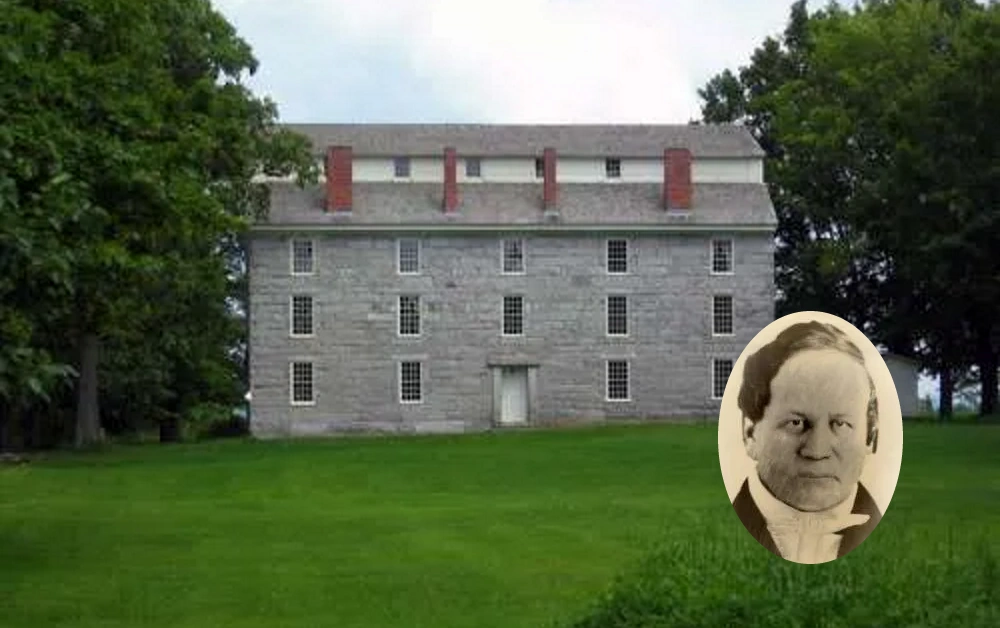One day at the Brownington school in Orleans County, Vt., a youngster approached the front of the class to answer an arithmetic question. His classmates, as a joke, pinned a handkerchief to his back and he unknowingly proceeded to the front of the class with it trailing behind, leaving a ripple of giggles in its wake. The school’s principal, Alexander Twilight, was not pleased.
The year would have been around 1853, and Twilight, no stranger to schoolboy pranks, sat silent for a bit before he spoke up: “It is a fool that laughs at the folly of a fool,” he said. The words were calculated to silence the classroom, and they did. They made such an impression that at least one student carried the lesson his whole life.
The man who delivered the lesson was the first black man in America ever to receive a college degree.
Alexander Twilight
Twilight was a Vermonter from birth. Researchers believe his father was Ichabod Twilight, a soldier who served in the Revolutionary War representing Warner, N.H. Perhaps the chance to earn his freedom as reward for his service as a soldier drew Ichabod into the New Hampshire militia.
Following the war, Ichabod established a family in Corinth, Vt., where Alexander was born on Sept. 23, 1795. As a young man, Alexander worked on a farm as an indentured servant early in his life. But then Middlebury College accepted him as a student on the strength of his strong mind and schooling at Randolph Academy.
Though census records identified him as black, his racial heritage was mixed and he might well have appeared to be white at first glance. It’s not clear whether Middlebury knew it was educating a black man or not. Nevertheless, he graduated and went on to be a minister and teacher.
Brownington
The Brownington grammar school was established in 1823 when the citizens of Orleans County threw open the doors of their newly built schoolhouse and welcomed the first class. The school survived mainly on the funds raised by renting out land that it had been granted for the purposes of supporting education.
In 1829, the school’s trustees reached out to hire Twilight. He was by then a seasoned teacher, with several years’ experience following his graduation in 1823. The school itself was in dire need of new leadership, and Twilight began immediately making improvements.
But without a dormitory-style boarding house, students had to board with local farmers. The environment that Twilight wanted for the school required a more formal dormitory and classrooms. When the trustees declined to fund it, he insisted. Relations grew very tense for several years, but the trustees refused to fund the larger facility.
Twilight decided to build it himself. He paid for it with a combination of his own funds and money borrowed from others. He quarried granite blocks from the surrounding area and, working with an ox to provide pull a system of pulleys, he and anyone he could corral to help built a large stone structure from the ground up.

Athenian Hall, also known as the Old Stone House
By 1836, he finished the structure: a large four-story, granite building with dormitory, kitchen, classrooms and assembly hall. Alexander Twilight named it Athenian Hall.
Athenian Hall
The school would prosper under Twilight’s leadership. Classes cost $2 to $3 each for a term, and Twilight’s reputation kept the school full. Before he departed in 1847, more than 3,000 students would pass through the school.
Twilight would also win election to the state Legislature and represent the county in attempting to stop the state from stripping its school of its funding.
One of his students would recall Alexander Twilight later: “His peculiar gift was in the management of a school. He seldom failed to get the good will and high esteem of his pupils,. His power to stimulate and direct them in regard to their character, studies and future pursuits was very great, He governed them wholly by appeals to their honor and manliness, but could use sterner persuasives when they were called for. Sometimes, when the subject and occasion demanded it, and all other measures failed, his power of invective, sarcasm, satire and ridicule were tremendous. No sensible rogue would wish to encounter it but once.”
Departure and Return
He left in 1847 because of a falling out with the school’s trustees and the deacons of his church. After his departure, the school closed for several years. Orleans residents eventually persuaded Twilight to return from Canada, where he had moved after the dispute, and the school reopened in 1852. Twilight would only preach one more year after his return, but he ran the school through 1855, when he finally closed it for good for lack of students.
Twilight would die two years later, on June 19, 1857, at the age of 62. His wife, Mercy Ladd Merrill Twilight, would live on for 21 more years. When she perished, her body was buried next to his at the foot of the hill below the stone building.
Today, a building at Middlebury College bears Twilight’s name, and his achievements, thanks largely to his own determination and character, are still celebrated to this day. And the stone school house that he built still stands and open for visitors; its website has an interesting collection of his sermons.
This story was updated in 2023. Image of Athenian Hall CC BY-SA 3.0, https://en.wikipedia.org/w/index.php?curid=34745682.

